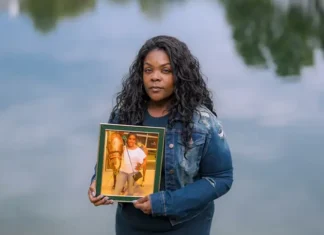
A simple question sparked complicated answers: “Would you participate in a clinical trial?”
“I would be nervous,” Baltimore resident Kim Pennington admits. “It has to be a sacrifice, and I don’t know if I want to sacrifice my health and my life for a trial.”
She’s not alone. Black women make up just 2% of all cancer clinical trial participants. Experts say this lack of participation is one of the reasons Black women are 38% more likely to die from breast cancer.
What Is a Clinical Trial?
Clinical trials aren’t experiments on strangers. They’re where new medications or treatments are tested on people who volunteer to participate, allowing researchers to determine if they’re safe and effective. It’s a form of medical research — and they’re often the only way patients can get access to the most advanced treatments.
“Clinical trials are just a marvelous opportunity to get the most cutting-edge therapy that’s available,” explains Georges C. Benjamin, M.D., executive director of the American Public Health Association.
So why are Black women underrepresented? The answer lies in a long history of exploitation and exclusion.
A 2023 survey of 257 Black women across the U.S. conducted by TOUCH, The Black Breast Cancer Alliance, found that historical mistreatment of Black bodies in the name of medical research contributes to hesitancy like Pennington’s.
“There is a long history of mistrust in the Black community of the medical establishment; much of it is well-founded,” says Oliver Brooks, M.D., past president of the National Medical Association.
A History of Medical Atrocities
Generations of Black folks know about Black men and women who were treated unjustly by the U.S. medical community:
- In the 1840s, the so-called father of gynecology, J. Marion Sims, perfected surgical techniques still employed today by operating on enslaved women without anesthesia. His statue stood in Central Park until 2018.
- Throughout the 20th century, Black men and women were sterilized without consent.
- From 1932 to 1972, the U.S. Public Health Service let hundreds of Black men in Alabama go untreated for syphilis under false pretenses. They were told they were being treated for “bad blood,” but researchers were purposely withholding treatment so they could study the progression of the disease. That study ended in 1972.
- In the 1950s, Henrietta Lacks went to Johns Hopkins complaining of vaginal bleeding. The institution took her cells without consent, and the medical community continues to use them for research today. Her descendants only reached a settlement over her cells in 2023.
More Than Just Fear
Today, federal consent and ethics laws protect people participating in research studies. But mistrust isn’t the only reason Black women stay out of clinical trials. Ricki Fairley, co-founder of TOUCH, The Black Breast Cancer Alliance —– the organization that conducted the survey on Black women and hesitancy —- says some Black women may fear being “guinea pigs.” But the biggest reason they don’t participate in clinical trials is recruitment — or the lack thereof.
“Whether it’s illicit bias, racism, or whatever you want to call it, we’re not invited,” she says.
“I know I wasn’t asked,” adds Latoya Bolds-Johnson, a breast cancer survivor. “I had to push for it.”
Diagnosed at 36, the mother of three says her doctor shrugged off her request to join a clinical trial. “He was very dismissive about it,” Bolds-Johnson says. She had to find another physician willing to enroll her in a study.
“Clinical trials do save lives,” she says.
Fairley knows this first-hand. A breast cancer survivor herself, she credits a clinical trial with saving her life. That’s why she launched the campaign called When We Tri(al).
The initiative features an online platform that enables Black women to complete questionnaires, which are then matched with clinical trials relevant to them and their health needs. Fairley says the effort has helped enroll more than 25,000 Black women into clinical trials.
Why Black Women’s Participation in Cancer Trials Matters
Fairley says that when more Black women participate in clinical research, it helps scientists better understand how conditions like breast cancer impact them.
“There’s a growing body of science that is validating that a Black breast cancer cell looks totally different from a white breast cancer cell,” Fairley explains. “And guess what the drug [cancer treatments] were made on? The drugs were made on white cells.”
A research team at the Johns Hopkins University School of Medicine announced similar findings. Diplai Sharma, Ph.D., and her team discovered that breast cancer cells from Black women multiply at faster rates and are more likely to spread to other organs than cells from white women.
Over the last several years, she and her team have been comparing breast tissue donated with consent by Black and white women who were diagnosed with triple-negative breast cancer (TNBC), one of the most aggressive types. Black women are disproportionately affected by this variant of the disease.
“Why [are] younger African American women getting TBNC, and why when they get TBNC, is it so aggressive?” Sharma asks. “That was our goal, to understand that.”
The Johns Hopkins team is now testing a treatment option shown to slow these aggressive cancer cells among Black women. However, before it becomes available to patients, the next step is for researchers to conduct a clinical trial.
Advancing Black Breast Cancer Research
Part one of this series explored how Black breast cancer research like Sharma’s is under threat because of the Trump administration’s stance on DEI.
For Georges Benjamin, the head of the American Public Health Association, the stakes couldn’t be higher.
“We will push back,” he says. “In the end, we will win. But if you don’t do these things with intention, they won’t happen.”
That intention, he says, starts with trust. Researchers must also reconsider their approach to working with members of the Black community if they want to advance medical research.
“To go into research for a clinical trial, you have to have a lot of trust that the doctors aren’t, quote-unquote, experimenting on you,” he says. “Well, guess what? They actually are.”
That is why, he argues, effective medical research requires cultural sensitivity and relationship building, including with trusted Black physicians and pharmacists who can relay clinical trial information to their patients.
Earning Black Women’s Trust
Columbia University professor Adana Llanos Wilson, Ph.D, an epidemiologist who’s conducted dozens of studies around Black women and breast cancer, agrees. She says the issue isn’t getting more Black women to participate in research; it’s the medical community’s failure to earn their trust in the first place.
“When we build authentic relationships with communities, when our research teams reflect the populations we aim to serve, and when we show up with respect and transparency – Black women show up too,” Wilson wrote in an email to Word In Black.
For Bolds-Johnson, participating in a clinical trial was a no-brainer.
“I needed my body to be studied,” she explains. “I have three daughters who will develop breasts soon, and whatever I could do to contribute [to] Black research, I needed to do it. I had to do this for my children — my girls.”
This is part two of a multimedia series exploring Black women and breast cancer. It was published with the assistance of the Journalism & Women Symposium (JAWS) Health Journalism Fellowship, supported by the Commonwealth Fund.













